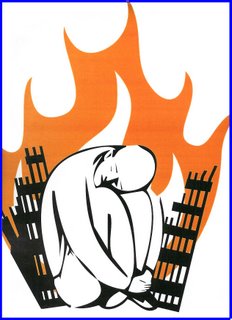Memories are made of this ...

We have all suffered traumas. Most of them have been minor, and such shocks or painful memories are part of the human condition. As I say, most are minor, like wetting your pants in gym in third grade or coming home from a date only to find you had spinach between your teeth. Minor they may be, but the memories can be revisited time and again over the years, and the memories are painfully clear, and your emotional pain from the time is equally clear inasmuch as you might not remember what you had for dinner last Tuesday, but you will vividly remember if, on that same day, you were nearly nailed by some moron running a stop sign. An incident that left you with palpitations for the next hour.
So, yes, you will go back to those minor trauma times. It's a bit like picking a scab. You know you shouldn't, but somehow you can't help it. It satisfies something masochistic within you.
Then there are the major traumas of life, and most of us have had those, one way or another. Few of us can have reached a certain age without having been forced to endure stressors like deaths in the family or among friends, separations and/or divorces, stints in the armed forces, major traffic accidents, injuries, incarcerations, rape, emotional breakdowns and all the other elements of a lifetime's painful moments. Your emotional health today will depend very much on how you have handled your major traumas. Have they left you paranoid and crippled emotionally? Or, have you learned from your significant stresses and become stronger as a consequence. The latter is an example of having used trauma to grow and thrive. We have all met such people, and we are amazed at their resiliency. And, we are gratified by the lessons about life that they can give to the rest of us.
Ultimately it comes down to the question of whether trauma is a good or bad thing for the human condition. How we respond to monumental crises depends on us as individuals, to be certain. There are those who will shrink away and take to their beds at a perceived insult delivered at a cocktail party, and there are those others who survived the extermination camps of the Holocaust and have grown and assumed leadership roles in the world. Most didn't, but some did. There is no way of explaining that. How did Senator John McCain survive his years of POW torture and come out the other side? Scores didn't. Were they lesser human beings? I doubt it. Does McCain still have nightmares? I bet he does. My grandfather, who was in the trenches of World War One for four years had nightmares throughout his life, until his death in 1958. How could one not?
But, suppose science had a way of eliminating your traumatic memories. Suppose science could arrange it so that you would never have to revisit those incidents or conditions that once changed your life, seemingly irrevocably?
Well, in fact, science can now do that -- or is on the crest of being able to do that. Experiments at McGill University have found that memories of traumatic events can be altered with drugs. Nothing new about the knowledge that certain drugs or substances can change our memory processes. Alcoholic blackouts, as many recovered alcoholics can attest to, will completely obliterate the memory of a blackout time, and whatever happened in that time can never be redeemed. I have a dear friend who has been sober for more than 20 years who once lost an entire two weeks of his life. It scared the hell out of him, and got him sober. He has no idea what happened during that fortnight. "I could have killed somebody and would have no way of knowing," he told me once. "That scared the shit out of me. I decided then that I'd had my last drink."
However, the experiments at McGill are a bit different. The scientists do not want to obliterate the memory, they just want to kill the pain that goes with it. so that trauma sufferers do not need to be in emotional agony due to a rape or accident. Sounds good, doesn't it? The use of beta blockers in the process simply turns down the intensity of the memory, and lets us get on with life.
But, is this a good thing? Trauma happens for a reason. It gives us certain tools to avoid repeating a situation, to grow, to thrive, despite adversity. Some people have the ability to do this intrinsically. Some don't. It is, to lapse into cliche, a double-edge sword that could heal the wounded, but also encourage pain-avoidance, much like our multitudes of other drugs already do. It's a valid assumption to suggest that many drug addicts and alcoholics consume their substance, not because they like it particularly, but because it makes pain go away, albeit temporarily. What if there was a drug that could make it go away for keeps.
What are your thoughts on this?


5 Comments:
What an interesting post. Without pain there can be no pleasure. How could we possibly appreciate the good times in our lives if we couldn’t remember the bad. We would just keep repeating the bad instead of reaching for the good.
I have had some horrible things happen in my life and I use those things as a benchmark for the good things that have happened. And I appreciate simple pleasures more. It doesn't take a lot to make me happy, but that might not necessarily be true if I could not remember the bad memories.
Anyway, to me it sounds a little bit like Newspeak from George Orwell's "1984" - like the same sort of mind control. It's too scarey for me.
Well, maybe there should be a drug for when people say things... and they are now embarrassed. I tend to do that. Then I feel like an idiot for the rest of the day.
Trauma's a strange thing, as you so aptly wrote.
Some come through with grace and for others it demolishes them.
Maybe a happy medium might be called for?
Ian, damn it! You're really good, you know that? I was really behind on my blogrun, and had no intention of commenting on every darn post I read - and then I got to your blog ...
You've really got me thinking hard on this one. Some of the stuff I've seen in the last year ... yah, it would be great to not have the pain of it hanging over me.
But Ian, would a person who didn't have the pain behind those memories still be the same person? Not that there's always a lot of comfort and joy behind being the "same person" ... but, it's who I am!
Now listen, you ask some pretty hard questions sometimes ... you make your readers squirm in their seats as they consider a right and proper (if not always honest) answer to your probing questions ...
... what about your answer?
Would you can the pain behind your worst memories?
Dear Moof: No, I have grown hugely from my worst times. My only approach to the memories is to not dredge them up unnecessarily. Otherwise, I think our bad times, if used correctly, are very valuable to us all.
Good question. Thank you.
Ian
Post a Comment
Subscribe to Post Comments [Atom]
<< Home